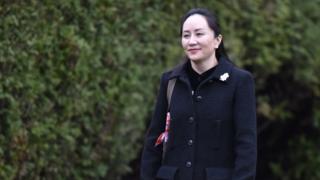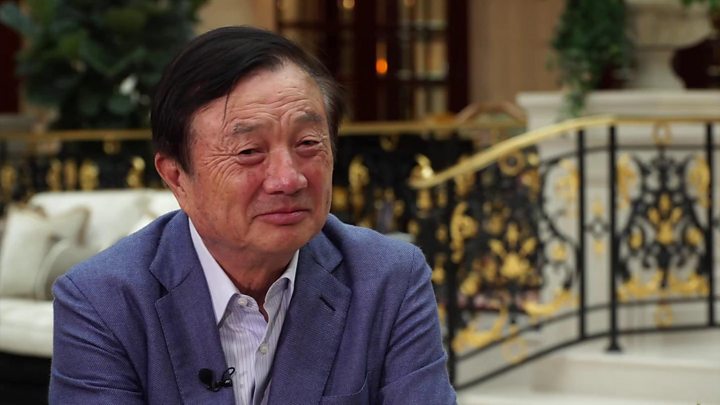
Image copyright
AFP
Meng Wanzhou’s case is being closely followed
A Canadian court has begun hearing the case of a senior Huawei executive fighting extradition to the United States.
Meng Wanzhou, 47, made no comment as she arrived at a Vancouver courthouse on Monday for a scheduled hearing.
The US wants Ms Meng to stand trial on charges including fraud linked to the alleged violation of US sanctions against Iran.
Ms Meng, who was arrested in late 2018 in Canada, denies any wrongdoing.
The case involving Huawei’s chief financial officer is being closely watched in Canada, the US and China.
Her arrest has created a rift between China and Canada. On Monday, Beijing repeated its calls for Canada to release Ms Meng.
“This is entirely a serious political incident that grossly violates the legitimate rights and interests of the Chinese citizen,” Chinese foreign ministry spokesperson Geng Shuang said.
Meanwhile, the Chinese telecoms giant said it stood by its executive “in her pursuit of justice and freedom”.
In a video statement released on its social media platforms as the hearing got underway, Huawei said it trusted in Canada’s judicial system “which will prove Ms Meng’s innocence”.
This first phase of hearings is scheduled to run from 20-24 January in the British Columbia supreme court in Vancouver.
The court will hear arguments on whether the crime Ms Meng is accused of by the US would also be considered a crime in Canada.
The judge must be satisfied that it meets the so-called “double criminality” test before agreeing to an extradition.
What is the background?
Ms Meng is the chief financial officer of the Chinese telecom giant Huawei and daughter of its founder Ren Zhengfei.
Ms Meng has been out on bail but under house arrest in Vancouver, where she owns property, since shortly after she was detained in December 2018.

Media playback is unsupported on your device
Shortly after her arrest, China detained two Canadian nationals – Michael Kovrig, a former diplomat, and Michael Spavor, a businessman – and has accused the pair of espionage.
The move by Beijing is widely viewed as “hostage diplomacy” – a tactic to put pressure on Canada to release the Huawei executive. Their detention has been called “arbitrary” by Canada and its allies.
Ms Meng’s arrest also led to a trade row between Canada and China, with China blocking tens of millions of dollars of canola exports.
China says the case is political persecution by the US.
Washington has been lobbying its allies – including the UK – to not use Huawei’s 5G technology services in critical communications infrastructure, alleging it could be a security threat.
How does the extradition process work?
If a judge is satisfied with the evidence presented, he or she will authorise that the individual be committed for extradition.
If not, the accused will be discharged and released from custody.
Even if the judge recommends extradition, it is the federal justice minister who makes the ultimate decision.
A second phase, focusing on allegations of abuse of process and whether Canadian officials followed the law while arresting Ms Meng, is due to be heard in June.
It is highly likely the overall process could be lengthy. Ms Meng has avenues to appeal throughout the process.
Source link






